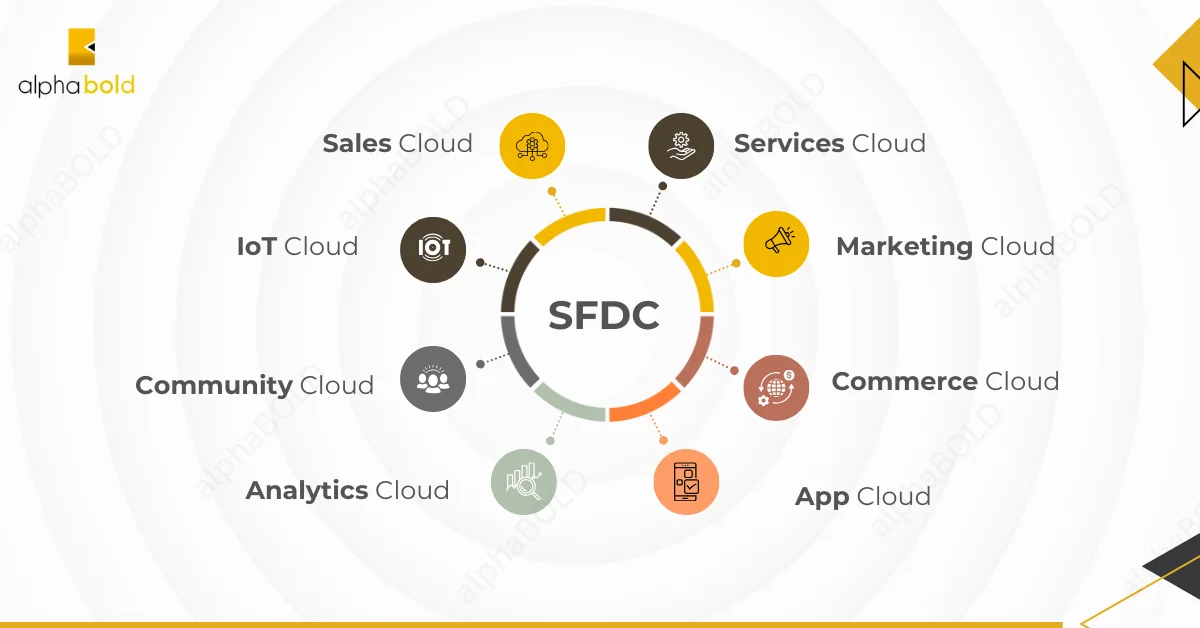Introduction
To standout form the competition and drive growth businesses are constantly seeking innovative solutions. At the forefront of this transformation is Salesforce, a leading provider of cloud-based CRM (Customer Relationship Management) solutions. It offers a diverse portfolio of products and services designed to meet the evolving needs of businesses across industries. In this comprehensive guide, we’ll explore a range of Salesforce products and how they can empower organizations to succeed.

Salesforce Core
At its core Salesforce offers a comprehensive suite of products that cater to various aspects of business operations. Integrated within Salesforce’s ecosystem, these products are designed to be scalable and customizable, catering to businesses of all sizes and industries. This integration helps companies streamline their operations, improve customer engagement, and achieve better business outcomes through more informed decision-making. Here is a brief rundown of Salesforce products that collectively shape customer journeys.
1. Salesforce CRM:
At the heart of the Salesforce ecosystem is its flagship CRM platform, which enables businesses to manage customer relationships, sales processes, and marketing campaigns with ease. Salesforce CRM provides a centralized hub for storing customer data, tracking interactions, and driving personalized engagement across every touchpoint.
Drive Growth Like Never Before with AlphaBOLD
Experience seamless management of your customer relationships, sales, and marketing—all in one place with Salesforce CRM.
Request a Demo2. Salesforce Sales Cloud:
Sales Cloud is Salesforce’s dedicated sales automation and CRM solution, empowering sales teams to sell smarter and faster. With features such as lead management, opportunity tracking, and sales forecasting, Sales Cloud helps organizations streamline their sales processes and drive revenue growth.
3. Service Cloud:
Service Cloud is Salesforce’s customer service and support platform, enabling businesses to deliver exceptional customer experiences across every channel. From case management and self-service portals to omnichannel support and AI-powered chatbots, Service Cloud equips organizations with the tools they need to exceed customer expectations and build lasting loyalty.
4. Marketing Cloud:
Marketing Cloud is Salesforce’s marketing automation and analytics platform, empowering marketers to create personalized campaigns, track customer journeys, and measure campaign performance. With features such as email marketing, social media management, and customer segmentation, Marketing Cloud helps businesses engage customers at every stage of the buying cycle.
Read More: Salesforce Marketing Cloud Intelligence: Transforming Data Management
Salesforce Products: Expanding the Ecosystem
1. Commerce Cloud:
Commerce Cloud is Salesforce’s e-commerce platform, enabling businesses to create seamless, personalized shopping experiences across web, mobile, social, and in-store channels. With features such as AI-powered product recommendations, omnichannel inventory management, and order management, Commerce Cloud helps organizations drive online sales and maximize customer lifetime value.
2. Community Cloud:
Community Cloud is Salesforce’s online community platform, enabling businesses to connect and collaborate with customers, partners, and employees in a branded online community. With features such as discussion forums, knowledge bases, and collaborative workspaces, Community Cloud helps organizations foster engagement, drive loyalty, and improve productivity.
3. Einstein Analytics (part of the Salesforce Customer 360 Platform):
Einstein AI is Salesforce’s suite of artificial intelligence-powered capabilities, embedded across its entire product portfolio. From predictive analytics and personalized recommendations to natural language processing and sentiment analysis, Einstein AI empowers organizations to unlock insights, automate processes, and deliver more intelligent customer experiences.
Beyond the Cloud: Salesforce Products
1. AppExchange:
AppExchange is Salesforce’s marketplace for enterprise cloud applications, offering a vast ecosystem of third-party apps and integrations that extend the functionality of Salesforce products. With thousands of pre-built solutions spanning every industry and use case, AppExchange enables organizations to customize and enhance their Salesforce experience to suit their unique needs.
2. Salesforce for Nonprofits:
Tailored solutions for nonprofits and educational institutions. Manage fundraising efforts, track program outcomes, and strengthen constituent relationships – all on a platform designed for your mission.
3. Heroku:
This cloud application platform allows businesses to build, deploy, and manage modern apps quickly and easily. It’s a Platform as a Service (PaaS), meaning it takes care of the underlying infrastructure (servers, operating systems, networking) so developers can focus on writing code and building applications.
Here are some key features of Heroku:
- Simplicity: Heroku is known for its ease of use. It provides a simple command-line interface (CLI) and a web-based interface for deploying and managing applications.
- Scalability: Heroku applications can be easily scaled up or down based on traffic needs. This makes it a good choice for applications that experience fluctuating traffic.
- Language Support: Heroku supports a wide range of programming languages, including Ruby, Node.js, Java, Python, PHP, and Go.
- Add-ons: Heroku offers a rich ecosystem of add-ons that provide additional features and services for your applications, such as databases, logging, monitoring, and authentication.
- Developer Experience: Heroku focuses on providing a great developer experience. It offers features like buildpacks, which automate the build process for your applications, and pipelines, which streamline the deployment process.
Here are some of the benefits of using Heroku:
- Faster Development: Heroku’s simplicity and ease of use can help developers get their applications up and running quickly.
- Reduced Costs: Because Heroku manages the underlying infrastructure, developers don’t need to spend time or money on server administration.
- Focus on Code: Heroku allows developers to focus on writing code and building applications, rather than worrying about infrastructure.
- Scalability: Heroku applications can easily scale to meet the needs of your business.
4. MuleSoft:
MuleSoft is a software company that provides an integration platform for connecting applications, data, and devices across on-premises and cloud environments. Its flagship product, Anypoint Platform, offers a suite of tools for designing, building, and managing APIs (Application Programming Interfaces) and integrations.
Anypoint Platform includes several components:
- API Designer: A web-based tool for designing APIs with a RAML (RESTful API Modeling Language) editor.
- Anypoint Studio: An Eclipse-based IDE (Integrated Development Environment) for building integration flows using graphical tools and connectors.
- Anypoint Exchange: A marketplace for discovering, sharing, and reusing APIs, connectors, templates, and other integration assets.
- Anypoint Management Center: A web-based console for managing APIs, integrations, policies, and runtime environments.
- Anypoint Connectors: Pre-built connectors that facilitate integration with various systems, services, and protocols.
5. Slack:
Slack is a cloud-based collaboration tool designed to facilitate communication and teamwork within organizations. It offers various features to streamline messaging, file sharing, and project management, ultimately aiming to reduce email dependency and improve productivity.
Key features of Slack include:
- Channels: Users can create channels for specific topics, teams, projects, or departments, enabling focused discussions and collaboration. Channels can be public for everyone in the workspace or private for selected members.
- Messaging: Slack provides real-time messaging functionality, allowing users to send direct messages to individuals or groups. Users can also share files, images, and documents directly within the chat interface.
- Integrations: Slack integrates with numerous third-party apps and services, such as Google Drive, Trello, GitHub, and many others. These integrations enable users to bring data and notifications from various tools directly into Slack channels.
- Search: Slack offers powerful search capabilities, allowing users to quickly find messages, files, and conversations. Advanced search filters help narrow down results based on keywords, dates, and other criteria.
- Notifications: Users can customize their notification settings to control how they receive alerts for mentions, messages, and activity within Slack.
- Workflow Automation: Slack allows users to automate repetitive tasks and workflows using Slack Workflow Builder or by integrating with workflow automation tools like Zapier or Slack’s API.
- Voice and Video Calls: Slack supports voice and video calls, enabling remote teams to communicate face-to-face when needed.
Choosing the Right Salesforce Products
With so much to choose from, it’s important to select the Salesforce products that align with your specific business goals and customer needs. Consider factors like your industry, company size, and budget.
Remember, Salesforce is a scalable platform. You can start with core products like Sales Cloud and Service Cloud, and then add on functionalities like Marketing Cloud or Commerce Cloud as your business grows. Still, if you are in a bind with choosing the best suitable Salesforce product you can always consult with a Salesforce partner like AlphaBOLD.
Read More: Leveraging Advanced Salesforce Features for Enterprises
Partnering with AlphaBOLD for Salesforce Implementation: A Strategy for Success
Choosing AlphaBOLD as your Salesforce implementation partner can significantly enhance your business outcomes. Statistics show that companies using Salesforce CRM see, on average, a 37% increase in sales revenue, a 45% boost in customer satisfaction, and a 43% improvement in marketing ROI. With AlphaBOLD’s expertise in tailoring Salesforce solutions, your business can achieve these results too, ensuring that every customer interaction is optimized for maximum engagement and profitability. Join the ranks of successful companies that have transformed their customer relationship management using Salesforce products with AlphaBOLD.
Tap into Your Business Potential with AlphaBOLD
Optimize your sales and marketing efforts to achieve unprecedented growth.
Request a DemoConclusion
As organizations continue to navigate the complexities of changing business dynamics, Salesforce products remain a trusted partner in driving innovation, growth, and success. With its diverse portfolio of products and services, Salesforce offers organizations the tools they need to transform customer relationships, streamline operations, and thrive in the digital age. Whether you’re looking to optimize sales processes, deliver exceptional customer service, or drive personalized marketing campaigns, Salesforce has a solution to meet your needs. Explore the Salesforce ecosystem today and unlock the full potential of your business.
Explore Recent Blog Posts








